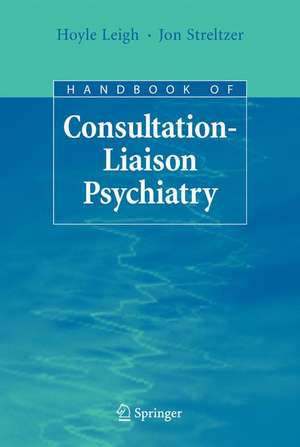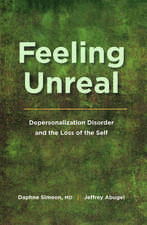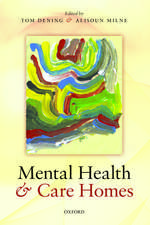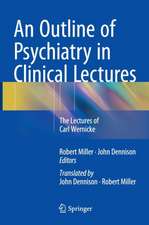Handbook of Consultation-Liaison Psychiatry
Editat de Hoyle Leigh, Jon Streltzeren Limba Engleză Hardback – 9 sep 2007
| Toate formatele și edițiile | Preț | Express |
|---|---|---|
| Paperback (2) | 891.99 lei 43-57 zile | |
| Springer Us – 5 mar 2008 | 891.99 lei 43-57 zile | |
| Springer International Publishing – 10 sep 2016 | 1573.54 lei 43-57 zile | |
| Hardback (2) | 734.01 lei 43-57 zile | |
| Springer Us – 9 sep 2007 | 734.01 lei 43-57 zile | |
| Springer International Publishing – 23 dec 2014 | 1634.14 lei 43-57 zile |
Preț: 734.01 lei
Preț vechi: 772.64 lei
-5% Nou
Puncte Express: 1101
Preț estimativ în valută:
140.47€ • 146.11$ • 115.97£
140.47€ • 146.11$ • 115.97£
Carte tipărită la comandă
Livrare economică 14-28 aprilie
Preluare comenzi: 021 569.72.76
Specificații
ISBN-13: 9780387692531
ISBN-10: 0387692533
Pagini: 420
Ilustrații: XIV, 420 p. 10 illus.
Dimensiuni: 178 x 254 x 26 mm
Greutate: 0.87 kg
Ediția:2007
Editura: Springer Us
Colecția Springer
Locul publicării:New York, NY, United States
ISBN-10: 0387692533
Pagini: 420
Ilustrații: XIV, 420 p. 10 illus.
Dimensiuni: 178 x 254 x 26 mm
Greutate: 0.87 kg
Ediția:2007
Editura: Springer Us
Colecția Springer
Locul publicării:New York, NY, United States
Public țintă
Professional/practitionerDescriere
Consultation-liaison psychiatry is an important interface between psychiatry and the rest of medicine as well as psychology, social work, nursing, and other behavioral science disciplines. This book is a practical, up-to-date handbook providing a biopsychosocial, integrative perspective and drawing the expertise of two renowned psychiatrists in the field. It is organized in five major sections addressing the fundamentals of the field as well as including an assessment of where the field is today. Chapters also address specific pathologies and populations.
Cuprins
Preface.- Part I: Nature and Evolution of CL Psychiatry.- Consultation-Liaison Psychiatry and Psychosomatic Medicine.- The Functions of CL Psychiatry.- The Why and How of Psychiatric Consultation.- Evidence Based Literature Evaluation in Consultation-Liaison Psychiatry.- Common Reasons for Consultation and their Management.- Part II: Psychiatric Syndromes in Consultation-Liaison Psychiatry.- Basic Foundations of Diagnosis, Psychiatric Diagnosis, and Final Common Pathway Syndromes.- Delirium, Dementia, Alcohol Intoxication and Withdrawal Syndromes.- Anxiety and Anxiety Syndromes, Acute Stress & PTSD.- Depression, Mania, and Mood Syndromes.- Psychosis.- Chronic Pain.- Substance Use Problems.- Psychological Factors Affecting Medical Conditions, Somatoform Disorders, Conversion, Dissociation, and Factitious Syndromes.- Somatization, Hypochondriasis, and Somatization Disorder.- Patient’s Personality, Personality Types and Traits, and Disorders.- Part III: Special Patients and Settings in Consultation-Liaison Psychiatry.- The Acutely Ill Patient and ICU Setting.- The Chronic Patient/Palliative Care Settings/The Dying Patient.- Consultation-liaison Psychiatry in the Outpatient Setting.- The Kidney Impaired Patient.- The Immune-Compromised Patients- HIV and Organ Transplantation.- The Liver Impaired Patient.- The Cross-Cultural Patient: Cultural Aspects of Consultation-Liaison Psychiatry.- Obstetrics and Gynecology Patients: Menstrual Cycle, Pregnancy and Postpartum Related Psychiatric Disorders.- Children and Adolescents.- The Geriatric Patient.- The Emergency Department Setting.- Part IV: Special Techniques in Consultation-Liaison Psychiatry.- Interviewing in Consultation-Liaison Psychiatry.- Systems Understanding and Intervention, Ethical Issues.- Special Procedures: Intravenous Sedative Interviews, Hoover Test, Hypnosis.
Recenzii
"... a remarkably complete and useful desktop book … should be required reading for most clinicians whose practice involves the interface of psychiatric and hospital-based medicine … a useful text for virtually all psychiatrists and psychiatric residents … exceedingly valuable for hospital attending and primary care physicians who do not have ready access to psychiatric consultants, particularly in the emergency department setting…." -Mark H. Fleisher, M.D., University of Nebraska College of Medicine, Omaha
Notă biografică
Hoyle Leigh, MD, is Professor Psychiatry at University of California, San Francisco. He is the author of a number of books on consultation-liaison psychiatry and behavioral sciences, including "The Patient: Biological, Psychological, and Social Dimensions of medical Practice" (Plenum/Kluwer, three editions). Previously, he was Professor of Psychiatry at Yale University where he established the Yale Behavioral Medicine Clinic that pioneered the field of behavioral medicine.
Jon Streltzer, MD, is Professor of Psychiatry at University of Hawaii. He is renowned for his work in cultural psychiatry, psychonephrology, and chronic pain. He is a co-author of "Culture and Psychopathology: Guidelines for Clinical Assessment" and "Culture and Psychotherapy: A Guide to Clinical Practice."
Jon Streltzer, MD, is Professor of Psychiatry at University of Hawaii. He is renowned for his work in cultural psychiatry, psychonephrology, and chronic pain. He is a co-author of "Culture and Psychopathology: Guidelines for Clinical Assessment" and "Culture and Psychotherapy: A Guide to Clinical Practice."
Textul de pe ultima copertă
Linking the medical and psychological components of a patient’s condition, facilitating communication among patients, doctors, families, and hospital systems, consultation-liaison work has emerged as one of the most challenging of psychiatric skills. The Handbook of Consultation-Liaison Psychiatry takes a practical biopsychosocial approach to helping readers navigate this complex terrain.
The authors and their 17 colleagues emphasize the flexibility CL practice demands, the team setting it entails, and the clinical and empathy skills it requires. Early chapters trace the roots of psychosomatic medicine and consultation-liaison psychiatry, the nature of psychiatric diagnosis, and explain the clinical, educational, administrative, and research functions of CL psychiatry, and walk the reader through the basics of psychiatric consultation. They discuss common reasons for psychiatric consultation and the immediate management of urgent conditions such as agitation and suicidal behavior. From there, chapters feature case vignettes, practice guidelines, and specific information on topics as varied as postpartum depression, withdrawal symptoms, and chronic pain. And in keeping with this real-world orientation, contributors identify cultural issues, analyze ethical concerns, and flag the potential conflicts of interest that practitioners must recognize and prevent for successful practice.
Highlights of the coverage:
Visit:
http://blogs.springer.com/consultation-liaison to discuss the topic with the Editors!
The authors and their 17 colleagues emphasize the flexibility CL practice demands, the team setting it entails, and the clinical and empathy skills it requires. Early chapters trace the roots of psychosomatic medicine and consultation-liaison psychiatry, the nature of psychiatric diagnosis, and explain the clinical, educational, administrative, and research functions of CL psychiatry, and walk the reader through the basics of psychiatric consultation. They discuss common reasons for psychiatric consultation and the immediate management of urgent conditions such as agitation and suicidal behavior. From there, chapters feature case vignettes, practice guidelines, and specific information on topics as varied as postpartum depression, withdrawal symptoms, and chronic pain. And in keeping with this real-world orientation, contributors identify cultural issues, analyze ethical concerns, and flag the potential conflicts of interest that practitioners must recognize and prevent for successful practice.
Highlights of the coverage:
- Foundations of the field—origins of CL psychiatry, an evolutionary, gene-environment interactional model of psychiatric illness, reasons for consultation, empirical findings on CL psychiatry.
- A downloadable Consultation Database that automatically generates consultation reports.
- Psychiatric conditions—anxiety, depression, psychosis, somatoform disorders, pain, PTSD, substance abuse, delirium and dementia.
- Medical settings and issues—ICU, palliative care, emergency care, outpatient, ethical issues, competency, emergency hold.
- Special populations—children/adolescents, geriatric patients, immune-compromised patients, kidney and liver diseased patients, pregnant patients.
- Key techniques—interviewing, psychopharmacology, detoxification, relaxation methods (including hypnosis), and more.
Visit:
http://blogs.springer.com/consultation-liaison to discuss the topic with the Editors!
Caracteristici
Provides a good balance of theoretical and practical info
Biopsychosocial, integrative approach
Balanced depth of perception
Specific instructions for consultation procedures, downloadable forms, relaxation techniques
Includes supplementary material: sn.pub/extras
Biopsychosocial, integrative approach
Balanced depth of perception
Specific instructions for consultation procedures, downloadable forms, relaxation techniques
Includes supplementary material: sn.pub/extras














